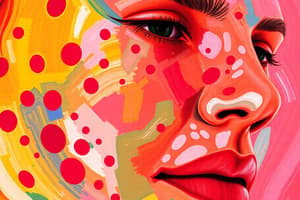Podcast
Questions and Answers
Which lifestyle modification is recommended to help prevent acne?
Which lifestyle modification is recommended to help prevent acne?
- Excessive sun exposure
- Using harsh skincare products
- Limiting stress levels (correct)
- Wearing tight clothing
What is the purpose of toning in a skincare routine for acne-prone skin?
What is the purpose of toning in a skincare routine for acne-prone skin?
- To balance skin's pH (correct)
- To apply spot treatment
- To moisturize the skin
- To remove dead cells
What is an example of a prescription treatment for more severe cases of acne?
What is an example of a prescription treatment for more severe cases of acne?
- Regular exfoliation
- Over-the-counter cleansers
- Avoiding high glycemic index foods
- Topical retinoids (correct)
Why is it crucial to consult with a healthcare professional before starting new acne treatments?
Why is it crucial to consult with a healthcare professional before starting new acne treatments?
How can acne impact mental health according to the text?
How can acne impact mental health according to the text?
What is a common prevention strategy for acne mentioned in the text?
What is a common prevention strategy for acne mentioned in the text?
Which of the following is NOT considered a primary cause of acne vulgaris?
Which of the following is NOT considered a primary cause of acne vulgaris?
Which of the following hormonal imbalances can contribute to the development of acne?
Which of the following hormonal imbalances can contribute to the development of acne?
Which type of food has been associated with an increased severity of acne?
Which type of food has been associated with an increased severity of acne?
Which of the following statements about acne is TRUE?
Which of the following statements about acne is TRUE?
Which of the following is NOT mentioned as a potential impact of acne?
Which of the following is NOT mentioned as a potential impact of acne?
Which of the following is NOT considered a potential contributor to the development of acne?
Which of the following is NOT considered a potential contributor to the development of acne?
Flashcards are hidden until you start studying
Study Notes
Understanding Acne Vulgaris: Causes, Treatments, Prevention, Skincare Routines, and Its Impact on Mental Health
Overview
Acne vulgaris, commonly known simply as acne, is the most widespread chronic skin condition in the United States, affecting nearly 50 million people. Primarily appearing in adolescents and young adults, acne can continue into the thirties and forties, leading to an economic burden of $3 billion due to medical costs and lost productivity.
Acne is typically found on the face, chest, or upper back and presents as non-inflammatory closed comedones (whiteheads), open comedones (blackheads), or inflammatory papules, nodules, pustules, and cysts. The severity of acne can range from mild, moderate, to severe, depending on the number and type of lesions present. While there is no universally accepted grading system for acne, its effects extend beyond physical symptoms.
Causes
The four main components of acne are sebum overproduction, abnormal shedding of follicular epithelium, follicular colonization by Cutibacterium acnes (formerly called Propionibacterium acnes), and inflammation. Hormonal imbalances, such as increased levels of androgens, can induce sebum production. Additionally, certain foods, especially those with a high glycemic index and skim milk, may increase acne severity. Psychological stress, tobacco smoke, and unhealthy skin can also play a role in the development of acne[9–13].
Treatments
While mild acne can often be managed with over-the-counter cleansers and creams, more severe cases may require prescription treatments like topical retinoids, systemic antibiotics, or even oral isotretinoin. Combination therapies involving topical retinoids, antibiotics, and benzoyl peroxide are often employed for moderate-to-severe acne.
Prevention
In addition to maintaining good skincare hygiene, avoiding tight clothing, and refraining from picking or squeezing acne lesions, some lifestyle modifications can help prevent acne. These include:
- Limiting consumption of high glycemic index foods and sugar.
- Avoiding excessive sun exposure, especially without adequate protection.
- Reducing stress, practicing mindfulness, and engaging in relaxation techniques.
- Using skincare products formulated for sensitive, acne-prone skin.
Skincare Routines
Establishing a regular skincare routine is key to managing acne. This might involve the following steps:
- Cleansing: Use a gentle cleanser appropriate for acne-prone skin twice daily.
- Toning: Apply a toner to balance skin's pH and remove any remaining impurities.
- Exfoliating: Regularly exfoliate the skin to remove dead cells and promote cell renewal.
- Spot Treatment: If necessary, apply a targeted spot treatment to trouble areas.
- Moisturize: Use a lightweight, non-comedogenic moisturizer that suits your skin type.
It's essential to remember that every person reacts differently to various treatments and skincare products. Therefore, it is crucial to consult with a healthcare professional or a dermatologist before starting any new treatments or skincare routines.
Impact on Mental Health
Acne's physical manifestations have been associated with negative impacts on mental health. Those suffering from acne may experience depression, anxiety, low self-esteem, and social isolation. Moreover, acne can be a source of embarrassment and bullying, further exacerbating the psychological toll.
Conclusion
Understanding the complex nature of acne vulgaris requires awareness of its underlying causes, effective treatments, and preventive measures. By combining this knowledge with a well-rounded skincare routine and considering the mental health implications, individuals with acne can improve their quality of life and overall wellbeing.
Studying That Suits You
Use AI to generate personalized quizzes and flashcards to suit your learning preferences.




